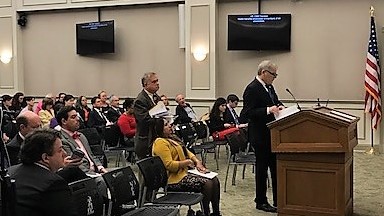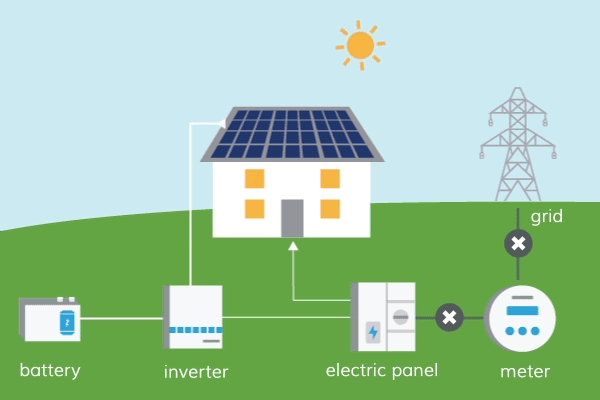We are now more than two weeks into the 2018 General Assembly session, and the pace has increased dramatically. Committees begin meeting at 7 a.m. and continue after session each day, often into the early evening. Most of my bills have not yet been reported to the House floor, although I have had success on several measures at the committee level.
Preservation, Medical Marijuana, And Parental Leave
My bill to assist the Preservers of the Daughters of Zion Cemetery with funding for their ongoing and important restoration efforts here in Charlottesville sailed through a subcommittee hearing, and is likely to be passed by the House next week.
I have supported various efforts to use cannabidiol oil or THC-A oil, derived from marijuana, to treat pain associated with a number of serious illnesses, and to broaden physicians’ ability to prescribe them for this purpose. At present, these oils can only be prescribed for intractable epilepsy. A measure I introduced to expand their availability to other illnesses has been heard in subcommittee and will move to the full Courts of Justice Committee soon. And Democratic bills (including mine) to mandate 12 weeks of parental leave for state employees when they add a child to their family, by birth or adoption, are awaiting action in an Appropriations subcommittee; I hope to be able to report progress on this soon.
Expanding DNA Database Use For Crime Solving
I have been encouraged by the response to proposals I made to expand the state’s DNA database, so that we might increase our ability to use this scientific tool to exonerate the innocent and convict the guilty. I filed two bills, HB1249 and HB1264 (both endorsed by the Crime Commission) that would add several additional misdemeanor crimes to the existing list of offenses for which DNA samples are collected from persons found guilty of that offense. These proposals were generated in response to the murder of Hannah Graham. If we had expanded the DNA database earlier, it is likely that the perpetrator, Jesse Matthew, who had been convicted of several misdemeanors prior to the Graham murder, would have been caught for another crime prior to Hannah’s death, and would therefore never had the opportunity to kill her. The Graham family, as well as the parents of Morgan Harrington, who also was killed by Matthew, have supported these measures, and testified for them in previous sessions and before the Crime Commission.
No one simply arrested for a crime, and no one acquitted of an offense, will have a DNA sample added to the database; samples will be taken only from those who are convicted. HB1249 was recommended by a subcommittee on Friday and will now be heard in the Courts of Justice Committee next week. The budget amendments to fund these bills have already been considered by an Appropriations subcommittee.
Fighting Increases In Healthcare Premiums

Several bills that I filed on behalf of Charlottesville and Albemarle County residents who have experienced the highest increases in healthcare insurance premiums in the nation for 2018 were considered in a Commerce and Labor subcommittee last Thursday, and referred for study. While I am disappointed the bills did not pass, it is very significant that my fellow House members understood the severity of this problem and committed themselves to address it over the next year. I will keep fighting to reduce these premium increases and work on ways that people who do not have access to healthcare insurance through an employer can seek out affordable alternatives for themselves and their families. Our options are limited at the state level; these problems have been caused by the Trump administration’s undermining of the Affordable Care Act and the solutions must be found in federal legislation. Nonetheless, we should try to do all we can for Virginians at the state level, and my bills will hopefully lead to some productive change.
Returning Monies To Utility Ratepayers
Perhaps the most significant bill of this session, one that involves the repeal of the electric utilities so-called “rate freeze” measure passed in 2015, has been introduced in the House — and it is severely lacking. The bill (HB1558) was largely drafted by the utility industry, and while proponents can point to several portions of the bill that will be helpful to consumers, it does not address the most serious problem: the amounts of money that Dominion and Appalachian Power have “over-earned” over the last several years. The only solution to this problem is to restore the power of the State Corporation Commission (SCC) to regulate the rates, determine the precise amount of over-earnings, and then rebate those over-earnings to ratepayers. We also must require the utilities to pass through their savings from recent changes to the federal tax law to their consumers. If the General Assembly embraces these two positions, it will lead to substantial rebates for ratepayers and perhaps a reduction in existing utility rates. The next question involves the extent to which the bill will require utilities to invest more in grid modernization, weatherization assistance, and renewable energy. At present, there are some portions of the bill that will do this, but not nearly as robustly as I would like. I recently joined five of my fellow Delegates in a letter to the SCC requesting various data be provided to the House so that the information can help shape the ultimate version of the bill. You can see a PDF copy of the letter here. We expect to receive that data shortly, and it will assist us in determining the amount of utility overearning. I will not vote for any bill that does not rebate substantial monies to ratepayers, reduce rates, and provide for major investments in renewable energy. We are in a unique position to do something very significant for the future, and we cannot let this opportunity pass.

Supporting Renewable Energy — Energy Storage Systems
My three energy bills for this session — HB1018, HB1503, and HJ101 — will be heard next week in various committees. HB1018 and HJ101 both relate to energy storage, a crucial component in our drive to move the Commonwealth toward much greater use of renewable energy sources. HB1018 will create a five-year pilot program granting an income tax credit for installing an energy storage system, based on the costs of installation (with caps). The state’s Department of Mines, Minerals and Energy (DMME) would be responsible for certifying which expenditures qualify for this tax credit. HJ101 will authorize DMME to conduct a two-year study related to the use of energy storage systems in Virginia now, and provide recommendations for any regulatory reforms or market incentives that might help to increase the use of these systems. HJ1503 will authorize the creation of community solar generation facilities anywhere in the state, which can enter into power purchase agreements (PPAs) with utilities on behalf of the solar facility’s subscribers. A subcommittee hearing on numerous renewable energy bills, including HB1503, is scheduled for Tuesday, January 30. The public is always welcome to subcommittee and committee hearings, but for those who cannot fit a trip to Richmond into their schedules, subcommittee meetings are livestreamed by citizen-journalist volunteers with Progress Virginia on the website EyesOnRichmond.org.
Visit Us in Richmond
If you are able to come to Richmond during the session, I hope that you’ll come by the Pocahontas Building at 900 E. Main Street to visit us in Room E601. It is always a pleasure to talk with constituents from the district I am honored to serve. We also appreciate ideas and feedback via email, telephone, or through my online constituent survey.
